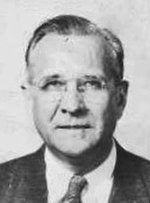Richard Harbert Smith, Date of Birth, Place of Birth, Date of Death
TweetRichard Harbert Smith
Professor and researcher of aeronautical engineering
 Date of Birth: 15-Jan-1894
Date of Birth: 15-Jan-1894
 Place of Birth: Dillsboro, Indiana, United States
Place of Birth: Dillsboro, Indiana, United States
Date of Death: 06-Jul-1957
Profession: engineer, aerospace engineer
Nationality: United States
Zodiac Sign: Capricorn 
About Richard Harbert Smith
- Richard Harbert Smith (15 January 1894, Dillsboro, Indiana – 6 July 1957, Alexandria, Virginia) was a professor and researcher of aeronautical engineering at the Massachusetts Institute of Technology (MIT), from 1929 to 1945.His academic education was developed at the Moores Hill College (BS, 1915), Indiana (today, University of Evansville); the Massachusetts Institute of Technology (SB, 1918), Cambridge (Greater Boston), Massachusetts; and the Johns Hopkins University (MA, 1928; PhD, 1929), Baltimore, Maryland. After World War I, Prof.
- Smith worked as an assistant at the United States Naval Research Laboratory.
- In 1929, he was an associate physicist at the Navy's laboratory when he was hired by the Massachusetts Institute of Technology as an associate professor of aeronautical engineering, being promoted to full professor in 1931. For many years, he was Dr.
- Jerome Clarke Hunsaker's assistant administrator for aeronautical engineering at MIT.During the World War II period, Prof.
- Smith coordinated the MIT Civilian Pilot Training Program and was also instructor for several classes of female engineering trainees for the Curtiss company. In 1945, he left MIT to go to Brazil, hired by the Brazilian government, in a venture led by Casimiro Montenegro Filho, then lieutenant-colonel of the Brazilian Air Force, to establish an institute of aeronautics, the Instituto Tecnológico de Aeronáutica (Aeronautical Technology Institute), of which he became the first rector.
- This was an outstanding contribution to the scientific and technological education in Brazil.
Read more at Wikipedia
See Also
- Famous People's Birthdays on 15 January, United States
- Famous People's Birthdays in January, United States
- Famous engineer's Birthdays on 15 January, United States
- Famous engineer's Birthdays in January, United States
- Famous aerospace engineer's Birthdays on 15 January, United States
- Famous aerospace engineer's Birthdays in January, United States

